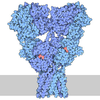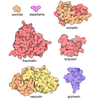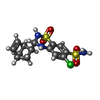[English] 日本語
 Yorodumi
Yorodumi- PDB-8fpl: LBD conformation 2 (LBDconf2) of GluA2 flip Q isoform of AMPA rec... -
+ Open data
Open data
- Basic information
Basic information
| Entry | Database: PDB / ID: 8fpl | ||||||
|---|---|---|---|---|---|---|---|
| Title | LBD conformation 2 (LBDconf2) of GluA2 flip Q isoform of AMPA receptor in complex with gain-of-function TARP gamma-2, with 10mM CaCl2, 150mM NaCl, 1mM MgCl2, 330uM CTZ, and 100uM CNQX (Closed-CaNaMg) | ||||||
 Components Components | Glutamate receptor 2 | ||||||
 Keywords Keywords | TRANSPORT PROTEIN / ionotropic glutamate receptors / AMPA receptors / ion channel / ligand-gated ion channel / auxiliary subunit / stargazing / TARP gamma2 | ||||||
| Function / homology |  Function and homology information Function and homology informationspine synapse / dendritic spine neck / dendritic spine head / cellular response to amine stimulus / Activation of AMPA receptors / perisynaptic space / ligand-gated monoatomic cation channel activity / AMPA glutamate receptor activity / Trafficking of GluR2-containing AMPA receptors / response to lithium ion ...spine synapse / dendritic spine neck / dendritic spine head / cellular response to amine stimulus / Activation of AMPA receptors / perisynaptic space / ligand-gated monoatomic cation channel activity / AMPA glutamate receptor activity / Trafficking of GluR2-containing AMPA receptors / response to lithium ion / kainate selective glutamate receptor activity / cellular response to glycine / AMPA glutamate receptor complex / extracellularly glutamate-gated ion channel activity / immunoglobulin binding / asymmetric synapse / ionotropic glutamate receptor complex / conditioned place preference / regulation of receptor recycling / glutamate receptor binding / Unblocking of NMDA receptors, glutamate binding and activation / positive regulation of synaptic transmission / regulation of synaptic transmission, glutamatergic / response to fungicide / glutamate-gated receptor activity / regulation of long-term synaptic depression / cytoskeletal protein binding / extracellular ligand-gated monoatomic ion channel activity / cellular response to brain-derived neurotrophic factor stimulus / glutamate-gated calcium ion channel activity / presynaptic active zone membrane / somatodendritic compartment / ionotropic glutamate receptor binding / dendrite membrane / ligand-gated monoatomic ion channel activity involved in regulation of presynaptic membrane potential / dendrite cytoplasm / ionotropic glutamate receptor signaling pathway / synaptic membrane / dendritic shaft / SNARE binding / PDZ domain binding / transmitter-gated monoatomic ion channel activity involved in regulation of postsynaptic membrane potential / synaptic transmission, glutamatergic / protein tetramerization / establishment of protein localization / postsynaptic density membrane / cerebral cortex development / modulation of chemical synaptic transmission / receptor internalization / Schaffer collateral - CA1 synapse / terminal bouton / synaptic vesicle / synaptic vesicle membrane / signaling receptor activity / presynapse / amyloid-beta binding / growth cone / presynaptic membrane / scaffold protein binding / perikaryon / dendritic spine / chemical synaptic transmission / postsynaptic membrane / neuron projection / postsynaptic density / axon / external side of plasma membrane / neuronal cell body / synapse / dendrite / protein kinase binding / protein-containing complex binding / glutamatergic synapse / cell surface / endoplasmic reticulum / protein-containing complex / identical protein binding / membrane / plasma membrane Similarity search - Function | ||||||
| Biological species |  | ||||||
| Method | ELECTRON MICROSCOPY / single particle reconstruction / cryo EM / Resolution: 2.81 Å | ||||||
 Authors Authors | Nakagawa, T. | ||||||
| Funding support |  United States, 1items United States, 1items
| ||||||
 Citation Citation |  Journal: Nat Struct Mol Biol / Year: 2024 Journal: Nat Struct Mol Biol / Year: 2024Title: The open gate of the AMPA receptor forms a Ca binding site critical in regulating ion transport. Authors: Terunaga Nakagawa / Xin-Tong Wang / Federico J Miguez-Cabello / Derek Bowie /   Abstract: Alpha-amino-3-hydroxyl-5-methyl-4-isoxazole-propionic acid receptors (AMPARs) are cation-selective ion channels that mediate most fast excitatory neurotransmission in the brain. Although their gating ...Alpha-amino-3-hydroxyl-5-methyl-4-isoxazole-propionic acid receptors (AMPARs) are cation-selective ion channels that mediate most fast excitatory neurotransmission in the brain. Although their gating mechanism has been studied extensively, understanding how cations traverse the pore has remained elusive. Here we investigated putative ion and water densities in the open pore of Ca-permeable AMPARs (rat GRIA2 flip-Q isoform) at 2.3-2.6 Å resolution. We show that the ion permeation pathway attains an extracellular Ca binding site (site-G) when the channel gate moves into the open configuration. Site-G is highly selective for Ca over Na, favoring the movement of Ca into the selectivity filter of the pore. Seizure-related N619K mutation, adjacent to site-G, promotes channel opening but attenuates Ca binding and thus diminishes Ca permeability. Our work identifies the importance of site-G, which coordinates with the Q/R site of the selectivity filter to ensure the preferential transport of Ca through the channel pore. | ||||||
| History |
|
- Structure visualization
Structure visualization
| Structure viewer | Molecule:  Molmil Molmil Jmol/JSmol Jmol/JSmol |
|---|
- Downloads & links
Downloads & links
- Download
Download
| PDBx/mmCIF format |  8fpl.cif.gz 8fpl.cif.gz | 255.8 KB | Display |  PDBx/mmCIF format PDBx/mmCIF format |
|---|---|---|---|---|
| PDB format |  pdb8fpl.ent.gz pdb8fpl.ent.gz | 178 KB | Display |  PDB format PDB format |
| PDBx/mmJSON format |  8fpl.json.gz 8fpl.json.gz | Tree view |  PDBx/mmJSON format PDBx/mmJSON format | |
| Others |  Other downloads Other downloads |
-Validation report
| Summary document |  8fpl_validation.pdf.gz 8fpl_validation.pdf.gz | 1.8 MB | Display |  wwPDB validaton report wwPDB validaton report |
|---|---|---|---|---|
| Full document |  8fpl_full_validation.pdf.gz 8fpl_full_validation.pdf.gz | 1.8 MB | Display | |
| Data in XML |  8fpl_validation.xml.gz 8fpl_validation.xml.gz | 51.4 KB | Display | |
| Data in CIF |  8fpl_validation.cif.gz 8fpl_validation.cif.gz | 70.8 KB | Display | |
| Arichive directory |  https://data.pdbj.org/pub/pdb/validation_reports/fp/8fpl https://data.pdbj.org/pub/pdb/validation_reports/fp/8fpl ftp://data.pdbj.org/pub/pdb/validation_reports/fp/8fpl ftp://data.pdbj.org/pub/pdb/validation_reports/fp/8fpl | HTTPS FTP |
-Related structure data
| Related structure data |  29368MC  8fp4C  8fp9C 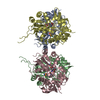 8fpcC  8fpgC 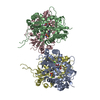 8fphC 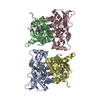 8fpkC  8fpsC 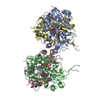 8fpvC 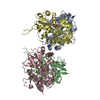 8fpyC 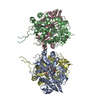 8fpzC  8fq1C 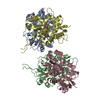 8fq2C 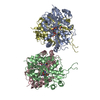 8fq3C  8fq5C 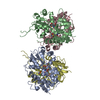 8fq6C 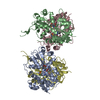 8fq8C 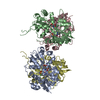 8fqaC  8fqbC 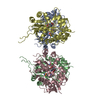 8fqdC 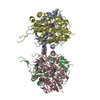 8fqeC  8fqfC 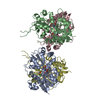 8fqgC 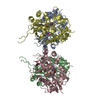 8fqhC 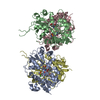 8fr0C M: map data used to model this data C: citing same article ( |
|---|---|
| Similar structure data | Similarity search - Function & homology  F&H Search F&H Search |
- Links
Links
- Assembly
Assembly
| Deposited unit | 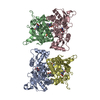
|
|---|---|
| 1 |
|
- Components
Components
| #1: Protein | Mass: 99559.461 Da / Num. of mol.: 4 / Mutation: FLAG epitope tag (DYKDDDDK) insertion Source method: isolated from a genetically manipulated source Source: (gene. exp.)   Homo sapiens (human) / References: UniProt: P19491 Homo sapiens (human) / References: UniProt: P19491#2: Chemical | ChemComp-Y4Y / Mass: 236.184 Da / Num. of mol.: 4 / Source method: obtained synthetically / Formula: C9H8N4O4 / Feature type: SUBJECT OF INVESTIGATION #3: Chemical | ChemComp-CYZ / Has ligand of interest | Y | Has protein modification | Y | |
|---|
-Experimental details
-Experiment
| Experiment | Method: ELECTRON MICROSCOPY |
|---|---|
| EM experiment | Aggregation state: PARTICLE / 3D reconstruction method: single particle reconstruction |
- Sample preparation
Sample preparation
| Component | Name: GluA2 flip-Q isoform in complex with TARP gamma2 (K52E, K53E) Type: COMPLEX / Entity ID: #1 / Source: RECOMBINANT | ||||||||||||||||||||||||||||||
|---|---|---|---|---|---|---|---|---|---|---|---|---|---|---|---|---|---|---|---|---|---|---|---|---|---|---|---|---|---|---|---|
| Molecular weight | Value: 0.5 MDa / Experimental value: NO | ||||||||||||||||||||||||||||||
| Source (natural) | Organism:  | ||||||||||||||||||||||||||||||
| Source (recombinant) | Organism:  Homo sapiens (human) / Cell: HEK Homo sapiens (human) / Cell: HEK | ||||||||||||||||||||||||||||||
| Buffer solution | pH: 8 Details: 6-cyano-7-nitroquinoxaline-2,3-dione (CNQX, final conc. 0.1mM) and cyclothiazide (CTZ, final conc. 0.33mM) was added before freezing. | ||||||||||||||||||||||||||||||
| Buffer component |
| ||||||||||||||||||||||||||||||
| Specimen | Embedding applied: NO / Shadowing applied: NO / Staining applied: NO / Vitrification applied: YES | ||||||||||||||||||||||||||||||
| Vitrification | Cryogen name: ETHANE |
- Electron microscopy imaging
Electron microscopy imaging
| Experimental equipment |  Model: Titan Krios / Image courtesy: FEI Company |
|---|---|
| Microscopy | Model: TFS KRIOS |
| Electron gun | Electron source:  FIELD EMISSION GUN / Accelerating voltage: 300 kV / Illumination mode: FLOOD BEAM FIELD EMISSION GUN / Accelerating voltage: 300 kV / Illumination mode: FLOOD BEAM |
| Electron lens | Mode: BRIGHT FIELD / Nominal magnification: 130000 X / Nominal defocus max: 1800 nm / Nominal defocus min: 800 nm / C2 aperture diameter: 50 µm / Alignment procedure: COMA FREE |
| Specimen holder | Cryogen: NITROGEN / Specimen holder model: FEI TITAN KRIOS AUTOGRID HOLDER |
| Image recording | Electron dose: 56 e/Å2 / Film or detector model: GATAN K3 BIOQUANTUM (6k x 4k) / Num. of grids imaged: 1 / Num. of real images: 34553 |
- Processing
Processing
| EM software |
| ||||||||||||||||||||||||||||||
|---|---|---|---|---|---|---|---|---|---|---|---|---|---|---|---|---|---|---|---|---|---|---|---|---|---|---|---|---|---|---|---|
| CTF correction | Type: PHASE FLIPPING AND AMPLITUDE CORRECTION | ||||||||||||||||||||||||||||||
| 3D reconstruction | Resolution: 2.81 Å / Resolution method: FSC 0.143 CUT-OFF / Num. of particles: 262250 / Algorithm: FOURIER SPACE / Num. of class averages: 1 / Symmetry type: POINT | ||||||||||||||||||||||||||||||
| Refine LS restraints |
|
 Movie
Movie Controller
Controller


























 PDBj
PDBj